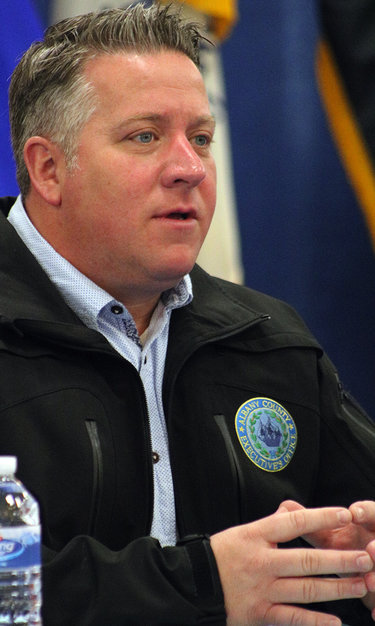Albany County announces first COVID-19 death
Our coronavirus coverage is free to access. Sign up here.
On Saturday afternoon, Albany County announced its first COVID-19 death.
The patient was a man in his 70s “with multiple underlying medical issues,” Albany County Executive Daniel McCoy announced; he died at St. Peter’s Hospital in Albany after a short stay.
On Sunday morning, at his daily press briefing, McCoy said of the death, “It’s not easy … It’s a blow to the stomach. My heart goes out to the family … The most vulnerable population is going to be hit.”
He stressed that people over the age of 70 should stay home and follow “Matilda’s Law,” issued last week by Governor Andrew Cuomo and named for his mother.
“Matilda’s Law” requires vulnerable New Yorkers to stay home and limit home visits to immediate family members or close friends in need of emergency assistance. If it is necessary to visit such individuals, the visitor should check his temperature first and not visit if he has a fever or cough. Both individuals should wear a mask for the duration of the visit.
The county’s health commissioner, Elizabeth Whalen, quoted her own mother, a nurse, as she made a passionate plea.
Whalen’s mother would ask Whalen and her siblings as they were growing up: Are you part of the problem or are you part of the solution?
“What side of history will you fall on?” asked Whalen on Sunday. “What will you do to be part of the solution?” Staying home, she said, “can mean the difference between life and death.”
On Sunday morning, McCoy reported there are now 187 confirmed cases of coronavirus disease 2019 in Albany County. That number was up from 178 on Friday. The number of confirmed cases in the county had, until recently, risen steadily since the first two were reported on March 12.
McCoy and Whalen have repeatedly said in recent days that many more residents in the county are likely to have the disease than the numbers show. McCoy estimated on Sunday that the number could be as high as 500.
The leveling off is because the county has been unable to get more test kits from the federal government so testing in Albany County is now limited to hospital patients and exposed health-care workers.
“It’s invisible. It’s a virus. You can’t see it. You can’t feel it until it affects you,” said Whalen. She also said people can have the disease without knowing and so inadvertently spread it.
Both McCoy and Whalen have been adamant about the need for more test kits in the county. “We need to continue to press on to get our tests … so we don’t turn into New York City,” said Whalen on Friday.
On Saturday, McCoy said he was hoping by “Tuesday at the latest to bring up testing.” He stressed that the county would coordinate with local hospitals to develop protocols on who would be tested.
McCoy announced on Sunday morning that there are now 505 people under mandatory quarantine and 233 under precautionary quarantine. On Sunday morning, 15 COVID-19 patients were hospitalized in Albany County, with seven in intensive-care units. The hospitalization rate was at just over 8 percent.
While Albany County, with a population of about 320,000, currently has enough hospital and intensive-care unit beds to handle COVID-19 patients, Whalen warned on Friday, “We see what’s happening downstate.”
Both McCoy and Whalen have repeatedly stressed that county residents should stay home. “For every person that gets it,” Whalen said of COVID-19, “they are likely to infect 2.2 additional people.”
She also quoted Jacinda Ardern, the prime minister of New Zealand who is locking down the nation for at least four weeks although there have been no deaths and only about 200 confirmed cases in New Zealand.
“You may not be at work, but that doesn’t mean you don’t have a job,” Adern said. “Your job is to save lives, and you can do that by staying home, and breaking the chain.”
“It’s for the greater good,” said Whalen on Saturday as she urged Albany County residents to stay home. “You are saving lives; you are making a difference.”
Both Whalen and McCoy spoke sternly on Sunday morning about police reports that restaurants are open. While restaurants, under Cuomo’s executive order, are allowed to deliver take-out food or distribute it curbside, customers are not allowed to congregate in restaurants or bars.
“I’m not going to call you out today,” McCoy said on Sunday to the owners who had opened their doors to customers. “I will call you out tomorrow.” He said a fine of up to $10,000 would be levied if it happened again.
Whalen added an establishment would lose its liquor license for violating the order.
“Everyone’s going to know,” McCoy said.
He also referenced Saturday’s death of the 70-year-old man, “Look what just happened to this family … We just want to protect your family going forward.”
Medical Reserve Corps
Friday’s press briefing featured two recent volunteers to the county’s Medical Reserve Corps: Angela Sears, a registered nurse who works for the Albany Academies, and Matt Miller, a teacher at Ravena-Coeymans-Selkirk who is also a county legislator.
With schools closed — and the governor this week extended the closures at least another two weeks — both Sears and Miller decided to volunteer for the county.
Sears said she started out returning phone calls, telling residents that their test results for COVID-19 had come back negative or weren’t yet back. The calls involved answering questions from anxious people.
This week, Sears started making intake calls for people under quarantine. She tells them how to keep social distance in the same household and instructs them on the importance of cleaning shared areas like kitchens and bathrooms. Sears also said she “hooks them up” with resources, for instance, if they need food or medicine.
“You never know what your job’s going to be,” said Sears, adding that the work is “very rewarding.”
She concluded, “They need volunteers to keep this work up because it’s a lot.”
Miller said he went online to the county’s website to sign up for volunteer work on Friday at 2:30 p.m., thinking he might hear back on Monday. “I got a call two hours later,” he said, and worked for four hours the next day.
Making phone calls to say quarantine is required can be “a little scary for people,” Miller said. It’s different telling them they are getting out of quarantine, he added.
“The mission changes basically every day,” said Miller. He praised the department of health for smoothly managing “on the fly.”
Commissioner Whalen said her department could not have had the response it’s had without the Medical Reserve Corps volunteers.
“We’re really very grateful for the work,” Whalen said. “People have many questions, understandably … it’s not always a quick conversation … We’re as nimble as we need to be.”
Whalen concluded of the volunteers, “Without them, we couldn’t be doing what we’re doing.”
Also on Friday, McCoy said a worker at the county’s nursing home, Shaker Place, had contracted COVID-19 but, because the county had put protocols in place ahead — including temperature checks for employees — the worker was stopped before coming into the nursing home.
“We caught it,” McCoy said. “Our mechanisms are working … everyone is still fine,” he said of nursing home residents and staff.
McCoy also announced that, starting on Monday, the Army National Guard will help the Regional Food Bank of Northeastern New York with delivering food to quarantined people.



